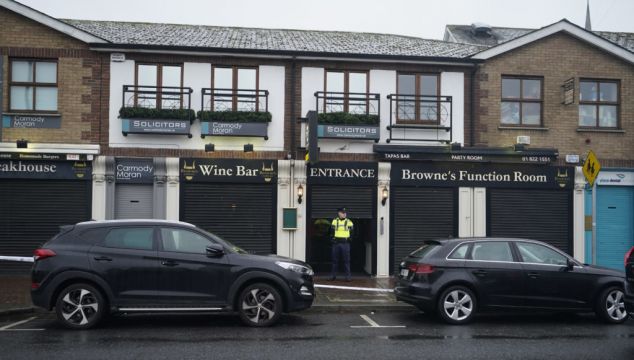Two men and a teenager charged with the murder of gunman Tristan Sherry in Blanchardstown on Christmas Eve have appealed the decision of a High Court judge to refuse them bail.
After hearing submissions from lawyers acting on behalf of the men at the Court of Appeal on Tuesday, Mr Justice George Birmingham said the court would reserve judgement on the matter and intended to reveal their decision on May 7th.
Mr Sherry (26) was killed after he shot and fatally injured Jason Hennessy Senior on December 24th, 2023, at Browne’s Steakhouse in Blanchardstown. Mr Hennessy died 11 days later.
David Amah (18), of Hazel Grove, Portrane Road, Donabate, and Michael Andrecut (22), Sheephill Avenue, Dublin 15, have been charged with Mr Sherry's murder.
The third person charged with Mr Sherry's murder, a 17-year-old youth, cannot be identified as he is a minor.

At the Court of Appeal on Tuesday, Seamus Clarke SC, for Mr Andrecut, said there were two grounds on which his client was refused bail; objections under Section 2 of the Bail Act and a concern that he would not attend his trial given the weight of the evidence against him and the likely sentence if convicted.
The prosecution also pointed to the evidence that Mr Andrecut's passport was in a bag thrown on a dog cage in the kitchen of his house when gardaí arrived three days after the incident.
Mr Clarke submitted that the judge erred in finding that strict conditions could not adequately deal with this aspect of the objection.
He said in relation to Section 2, the High Court judge, Mr Justice Tony Hunt, relied on the seriousness of the offence, the sentence likely to be imposed on conviction and the nature and strength of the evidence in support of the charge.
He said the judge had extracted from the evidence put forward at the bail hearing that because the appellant was aligned to one side in what the judge termed a "feud", there was a risk that further offences could be committed.
Mr Clarke said the view the judge took was “more grounded in conjecture” and what might happen in the future than in “hard evidence”.
He said the judge seemed to rely on the fear that a second gunman who came into the restaurant and then left might be a target in revenge. The guard, he said, had made comments that he had serious concerns “in relation to public safety”.
He said the reality was that the guard did not give evidence of “any particular feud as such”.
Mr Clarke said the guard’s evidence was based on “conjecture on what might happen” but was not backed up by any “hard facts”.
In relation to the passport, Mr Clarke said: "The fact that the passport is in a satchel in the kitchen on a dog cage, in my respectful submission there’s nothing extraordinary about it."
He said there simply wasn’t any evidential basis given, such as flights booked or a plan to flee.
Michael O’Higgins SC, on behalf of David Amah, said this was a "very, very unusual situation" where people were gathered on Christmas Eve when two gunmen came into a restaurant. He said the circumstances that followed were “completely and utterly chaotic".
Mr O’Higgins said on the O’Callaghan principle, the only ground advanced by the prosecution was that Mr Amah might flee. He said on the Section 2 ground there was a “very, very vague assertion that other offences might be committed”.
He submitted that one of the factors referenced by Mr Justice Hunt when refusing bail was the inadequacy of the address provided.
Mr O’Higgins said it appeared the basis for the judge’s concern, insofar as one could be determined, was that he believed Mr Amah’s personal safety would be at risk regardless of where he resided.
However, Mr O’Higgins said the focus [of Section 2] is restricted to whether the person seeking bail will commit offences and is not some “broad principle” that members of the public would have protection afforded to them on the basis of keeping someone in custody in case someone else tried to harm them.
Michael Bowman SC, on behalf of the 17-year-old, said in refusing the teenager bail under Section 2 the judge took the view that the youth was a “lightening rod” for “trouble and danger” and said he was satisfied that there were substantial risks to the community around this young man who is “plainly in serious danger”.
Mr Bowman said it was as if the judge was almost creating a “subset of events” where if there was a risk anticipated, bail is denied for fear of a wider consequence.
He said the judge had stated that the fact the teen is a child was “a factor, but no more than that”.
He submitted that Mr Justice Hunt erred in law in refusing bail under Section 2 of the Bail Act 1997 by failing to afford adequate weight to the presumption in favour of bail generally, and “more specifically”, the fact that the applicant was a child and that the refusal of bail ought only to have been a matter of last resort.
Fiona Murphy SC, for the Director of Public Prosecutions, said that the objection to the juvenile receiving bail was on the grounds that gardaí are concerned about revenge attacks or reprisals. She said the Garda concern in that regard was based on the level of violence on the night whereby within seconds of Mr Hennessy Snr being shot, Mr Sherry was disarmed, taken to the ground and subjected to "very serious violence".
In relation to Mr Andrecut and Mr Amah, Ms Murphy said there were objections under Section 2 of the Bail Act under which bail can be denied if gardaí have a genuine concern that the person would commit further offences. Ms Murphy said there were "very real concerns" that matters could escalate following the two deaths.







